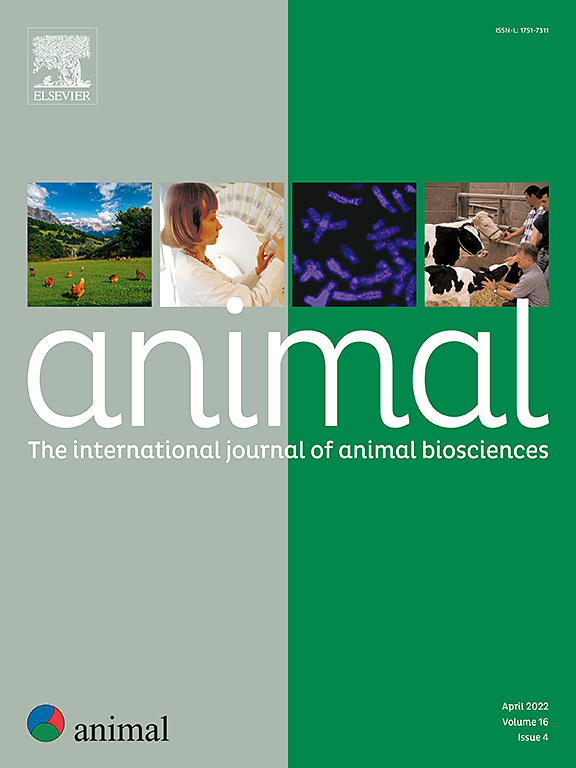利用基因组反应规范模型探讨热应激对热带肉牛饲料效率的影响
IF 4.2
2区 农林科学
Q1 AGRICULTURE, DAIRY & ANIMAL SCIENCE
引用次数: 0
摘要
全球气候变化给畜牧业生产带来了重大挑战,特别是在牛经常遭受热应激的热带地区。HS通过降低采食量、改变代谢过程和增加能量需求而对饲料效率产生负面影响,导致动物生产性能下降。了解牛对环境压力的反应对于通过育种计划提高效率至关重要。在此背景下,我们采用双性状基因组反应规范模型,考虑温度-湿度指数(THI)作为环境描述因子,研究了内洛牛干物质采食量(DMI)和剩余采食量(RFI)的基因型-环境相互作用(G × E)。研究人员分析了2011年至2023年在巴西21个农场收集的22 838只动物的数据。气象数据通过NASA POWER获取,THI值根据饲料效率试验期间记录的平均温度和相对湿度计算。利用18 567只动物的基因组数据,采用单步基因组最佳线性无偏预测方法估计遗传参数。饲料效率性状的遗传表达受到气候条件的影响,DMI(0.22 ~ 0.39)和RFI(0.08 ~ 0.28)的遗传力估计在THI梯度上有所不同。此外,在强热应激条件下,这两个性状的加性遗传变异均有所减少,表明环境因素对内洛尔牛饲料效率性状的表型变异具有重要作用。当THI超过76时,G × E的存在更为明显,因为同一性状在不同环境梯度下的遗传相关性降至0.80以下,导致大量的父系重排序。此外,DMI和RFI的遗传关系也随THI变化,遗传相关在0.64 ~ 0.72之间,表明不同热应激水平下饲料效率性状的遗传表达发生了变化。这些发现强调了在热带地区选择动物以提高饲料效率时考虑遗传可塑性的必要性。总的来说,这项研究为旨在提高肉牛对热应激的适应能力、确保面对气候变化的可持续生产的育种计划提供了有价值的见解。本文章由计算机程序翻译,如有差异,请以英文原文为准。
Exploring the impact of heat stress on feed efficiency in tropical beef cattle using genomic reaction norm models
Global climate change poses significant challenges to livestock production, particularly in tropical regions where cattle frequently experience heat stress (HS). HS negatively impacts feed efficiency by reducing feed intake, altering metabolic processes, and increasing energy requirements, leading to decreased animal performance. Understanding how cattle respond to environmental stressors is essential for improving efficiency by breeding programs. In this context, we investigated genotype-by-environment interaction (G × E) for dry matter intake (DMI) and residual feed intake (RFI) in Nellore cattle using bi-trait genomic reaction norm models and considering the temperature-humidity index (THI) as the environmental descriptor. Data from 22 838 animals collected between 2011 and 2023 across 21 Brazilian farms were analyzed. Meteorological data were obtained via NASA POWER, and THI values were calculated based on the average temperatures and relative humidity recorded during feed efficiency trials. Genomic data were available for 18 567 animals, and the genetic parameters were estimated using the single-step genomic best linear unbiased prediction approach. The genetic expression of feed efficiency traits was found to be influenced by climatic conditions, with heritability estimates for DMI (ranging from 0.22 to 0.39) and RFI (ranging from 0.08 to 0.28) varying across the THI gradient. Additionally, a reduction in additive genetic variance for both traits was observed under intense heat stress conditions, suggesting the important role of environmental factors on phenotypic variability of feed efficiency traits in Nellore cattle. The presence of G × E was more pronounced when THI exceeded 76, as genetic correlations for the same trait across different environmental gradients dropped below 0.80, leading to substantial sire reranking. Moreover, the genetic relationship between DMI and RFI also varied along the THI, with genetic correlations ranging from 0.64 to 0.72, highlighting alterations in the genetic expression of feed efficiency traits under different heat stress levels. These findings emphasize the need to consider genetic plasticity when selecting animals for improved feed efficiency in tropical regions. Overall, this study provides valuable insights for breeding programs aimed at improving beef cattle resilience to heat stress, ensuring sustainable production in the face of climate change.
求助全文
通过发布文献求助,成功后即可免费获取论文全文。
去求助
来源期刊

Animal
农林科学-奶制品与动物科学
CiteScore
7.50
自引率
2.80%
发文量
246
审稿时长
3 months
期刊介绍:
Editorial board
animal attracts the best research in animal biology and animal systems from across the spectrum of the agricultural, biomedical, and environmental sciences. It is the central element in an exciting collaboration between the British Society of Animal Science (BSAS), Institut National de la Recherche Agronomique (INRA) and the European Federation of Animal Science (EAAP) and represents a merging of three scientific journals: Animal Science; Animal Research; Reproduction, Nutrition, Development. animal publishes original cutting-edge research, ''hot'' topics and horizon-scanning reviews on animal-related aspects of the life sciences at the molecular, cellular, organ, whole animal and production system levels. The main subject areas include: breeding and genetics; nutrition; physiology and functional biology of systems; behaviour, health and welfare; farming systems, environmental impact and climate change; product quality, human health and well-being. Animal models and papers dealing with the integration of research between these topics and their impact on the environment and people are particularly welcome.
 求助内容:
求助内容: 应助结果提醒方式:
应助结果提醒方式:


